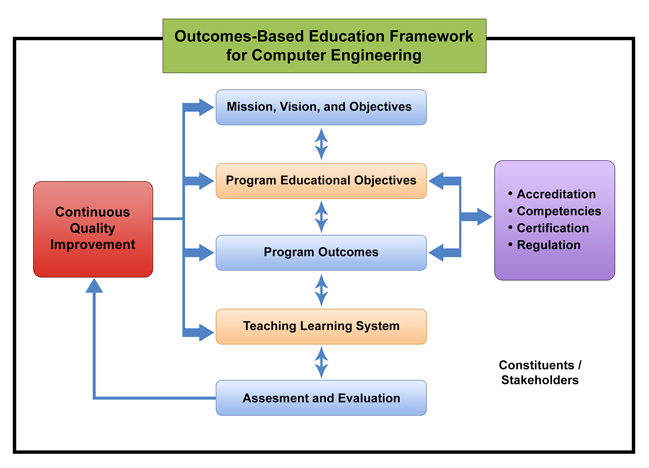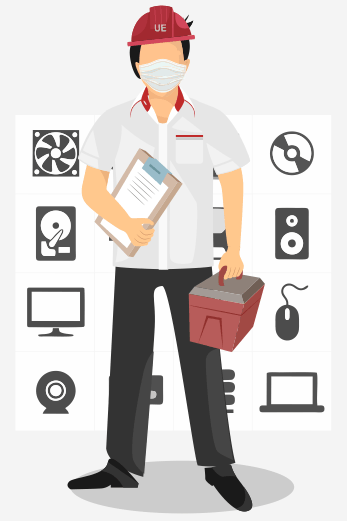Computer engineering deals with the application of engineering principles and methodologies in the analysis, design, implementation and management of hardware and software, and the integration of both.
The Computer Engineering (CpE) Program educates students to understand both sides of the hardware-software interface, from designing circuits to creating operating systems. Multidisciplinary in scope, the CpE curriculum integrates the fields of electrical engineering and computer science. This program will uniquely prepare CpE graduates to design and develop embedded digital and computer systems. Graduates with a degree in CpE will be highly skilled and ideally suited for 21st-century industries, including the games industry.
UE CpE concentrates on the practical application of theoretical learning through a variety of semestral and year long projects. Students will have increasing levels of creative control in their projects and receive feedback from expert instructors.


PROGRAM EDUCATIONAL OBJECTIVES
The University will produce Computer Engineering graduates who are:
STUDENT OUTCOMES
THE COMPUTER ENGINEERING CURRICULUM
The CpE curriculum and student projects will focus on embedded systems, a term that refers to any device that uses a microprocessor or microcontroller for a specific purpose. Embedded systems appear in a wide array of household and industrial systems, and including portable and console game systems, robots, game peripherals, electronic toys, digital cameras, audio/video component systems, and even aircraft flight systems.
THE UE CPE DESIGN AND LABORATORY EXPERIENCE
The computer engineering program at UE is a balance of engineering science and design. The freshman and sophomore year courses are structured to lay a solid foundation for the junior and senior level design courses by the introduction of courses in hardware, software and the engineering sciences (math, physics, and chemistry).
Design methodology and analysis techniques are stressed throughout the curriculum in the majority of the core courses required for graduation. The lecture classes are typically complemented by laboratory experiments that the student has designed, simulated and analyzed before commencing with the actual hands-on construction and testing. Students are well prepared in the software/hardware design procedure when they reach the final classes of Microprocessor System Design and the Senior Project Classes.
Skills in both software and hardware are employed in the design of a microcomputer system that require the student to write his own operating system in a high-level language ( e.g. C or C++) with embedded assembly language. The hardware support requirement is the design and implementation of a direct memory access (DMA) controller using a PLD or FPGA and a peripheral interface controller that supports a printer and an external bus. Students have several pattern electives to choose from in advanced software and hardware design classes. Such classes include topics in networks, embedded systems, VHDL, digital signal processing, state machine design, VLSI, control systems, communications and artificial intelligence.
The senior project class brings together, in a balance of solid software and hardware skills acquired throughout the required and elective curriculum, a culminating experience which involves teamwork, design, report writing and oral presentation. These experiences prepare our graduates to be successful engineers with an awareness of the many challenges involved in the workplace.
APPLICATIONS OF COMPUTER ENGINEERING INCLUDE:
Technology Areas
Application Domains
CAREER OPPORTUNITIES
UE’S CPE ACHIEVEMENTS
Philippine Accrediting Association of Schools, Colleges and Universities (PAASCU) Level III Re-Accredited
FACULTY
Dr. Paraluman G. Sim – Department Chair, Computer Engineering
Faculty Members
CpE Achievements to be added to the existing contents.
UE College of Engineering-Caloocan
Angelita D. Guia
Dean
Dr. Paraluman G. Sim
Associate Dean-Engineering
Dr. Maria Amelia E. Damian
Associate Dean-Computer Studies and Systems
Engr. Edelito A. Handig
College Secretary
UE College of Engineering-Caloocan Dean’s Office
✆ Dean: (632) 8-367-4572 local 166
✆ Direct Line: (632) 8-365-4121
Associate Dean and College Secretary:
✆ 8-367-4572 local 167
✆ Direct Line: 8-365-4121
General UE CEng’g Caloocan email address:
✉ ceng.cal@ue.edu.ph
Department Chairs Office:
✆ UE Caloocan Trunkline 8-367-4572
✆ CE Department: local 171
✆ CpE Department: local 172
✆ ECE Department: local 181
✆ EE Department: local 170
✆ ME Department: local 169
✆ CS/IT Department.: local 200
Social Info

